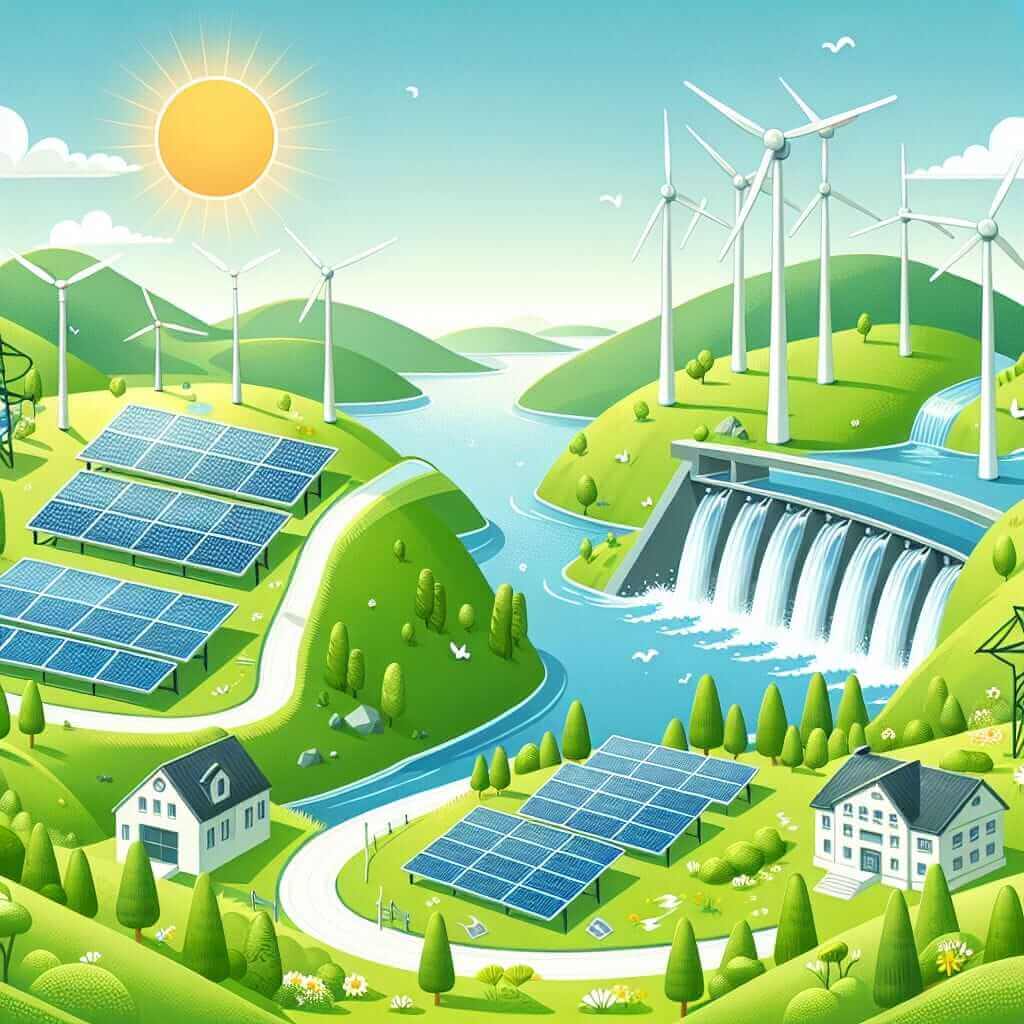The IELTS Reading test often includes passages on contemporary issues, and renewable energy is a topic that frequently appears due to its relevance and impact on global energy policies. Understanding how renewable energy is transforming national energy policies can provide invaluable practice material for your IELTS preparation. This article will explore this topic in depth and provide a detailed reading practice exercise, along with questions and answers typical of the IELTS Reading section.
Main Content
Reading Passage – Medium Text
Read the following passage carefully before answering the questions that follow.
Passage: How Renewable Energy Is Transforming National Energy Policies
Renewable energy sources such as solar, wind, and hydropower are playing a significant role in transforming national energy policies worldwide. The shift towards renewable energy is driven by various factors, including environmental concerns, technological advancements, and economic considerations.
Firstly, environmental concerns have been at the forefront of promoting renewable energy. The burning of fossil fuels is a major contributor to greenhouse gas emissions, leading to global warming and climate change. By contrast, renewable energy sources produce little to no emissions, offering a cleaner alternative to traditional energy sources. Governments are implementing policies to reduce carbon footprints by investing in sustainable energy projects and incentivizing businesses and residents to adopt renewable energy.
Technological advancements have also played a crucial role in the adoption of renewable energy. Innovations in solar panel efficiency, wind turbine technology, and energy storage systems have made renewable energy more viable and cost-effective. These advancements have reduced the cost of renewable energy production, making it competitive with conventional energy sources.
Economic considerations are another driving factor. Investing in renewable energy creates jobs and stimulates economic growth. Countries that invest in renewable energy can achieve energy independence, reducing reliance on imported fossil fuels. Additionally, the fluctuating prices of oil and gas can destabilize economies, whereas renewable energy sources provide a more stable and predictable energy supply.
Several nations serve as exemplary cases of how renewable energy is recalibrating energy policies. Germany’s Energiewende, or energy transition, aims to phase out nuclear and fossil fuels in favor of renewable sources. Similarly, China’s rapid expansion of solar and wind energy projects has made it a global leader in renewable energy capacity.
In conclusion, the transition to renewable energy is reshaping national energy policies by addressing environmental issues, incorporating technological innovations, and leveraging economic benefits. As more countries recognize the advantages of renewable energy, it will continue to play an essential role in the global energy landscape.

Reading Questions
Multiple Choice
-
What is NOT mentioned as a driver for the shift towards renewable energy?
A. Environmental concerns
B. Technological advancements
C. Political pressure
D. Economic considerations -
Which country’s renewable energy policy is known as Energiewende?
A. China
B. Germany
C. United States
D. India
True/False/Not Given
- The passage states that renewable energy sources produce no emissions.
- Technological innovations have made renewable energy less viable.
- Investing in renewable energy can help countries achieve energy independence.
Matching Information
Match the following statements with the correct paragraph (A, B, C, D):
- Environmental concerns are a major driver.
- Economic stability provided by renewable energy.
- Germany’s policy on renewable energy transition.
Answer Key and Explanation
-
Answer: C. Political pressure
Explanation: The passage mentions environmental concerns, technological advancements, and economic considerations as drivers, but political pressure is not mentioned. -
Answer: B. Germany
-
Answer: False
Explanation: The passage says that renewable energy sources produce little to no emissions, not none at all. -
Answer: False
Explanation: The passage indicates that technological advancements have made renewable energy more viable, not less. -
Answer: True
Explanation: The passage states that countries investing in renewable energy can achieve energy independence. -
Answer: A (Paragraph 1)
-
Answer: C (Paragraph 2)
-
Answer: D (Paragraph 3)
Common Mistakes
- Assuming no emissions: Remember that most texts will indicate low emissions from renewable energy, not zero emissions.
- Misunderstanding economic impact: Some candidates tend to overlook the economic benefits discussed; ensure you grasp the passage’s context.
- Confusing country policies: Keep track of which country implements which policy to avoid mistakes.
Vocabulary
- Emissions (n.) /ɪˈmɪʃən/ – The release of substances (usually gases) into the atmosphere.
- Viable (adj.) /ˈvaɪəbl/ – Capable of working successfully.
- Incentivizing (v.) /ɪnˈsɛntəˌvaɪzɪŋ/ – Providing an incentive or motivation.
Grammar Focus
Relative Clauses:
- Example: “Renewable energy sources, which produce little to no emissions, offer a cleaner alternative.”
Passive Voice:
- Example: “Policies are being implemented by governments to reduce carbon footprints.”
Conclusion
Effectively preparing for the IELTS Reading test involves understanding complex topics like renewable energy and its impact on national energy policies. Focus on comprehensively reading passages and practicing various question types to improve your performance. For further practice, read the article “How Is Renewable Energy Influencing Global Economic Policies?” available at IELTS.NET.
By analyzing related topics, expanding your vocabulary, and mastering grammar points, you can achieve higher scores in the IELTS Reading section. Good luck with your studies!